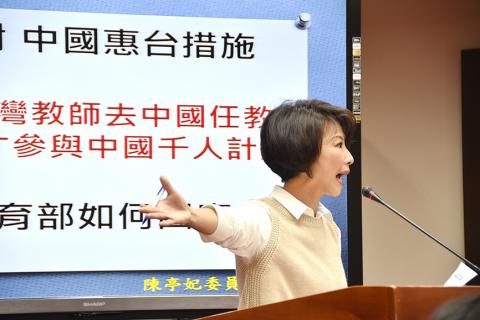China’s 31 incentives to attract Taiwanese businesses and professionals would only have a limited effect on Taiwan, National Development Council (NDC) Minister Chen Mei-ling (陳美伶) said yesterday, adding that the government will introduce better incentives to retain talented people.
The 31 incentives, announced by China’s Taiwan Affairs Office on Feb. 28, include tax cuts, investment capital and relaxed restrictions on certification for 134 professions, which sparked concerns at home over Taiwan losing its competitiveness.
Premier William Lai (賴清德) was originally planning to hold a cross-agency meeting yesterday to discuss the government’s response strategies, but the Executive Yuan on Sunday night canceled the meeting, saying more time is needed to collect information.

Photo: Wu Po-hsuan, Taipei Times
Chen yesterday attended a question-and-answer session at the legislature’s Economics Committee to report on the council’s policies.
The Executive Yuan has convened an ad hoc committee, presided by Vice Premier Shih Jun-ji (施俊吉), to collect response strategies from government agencies, Chen said.
The strategies have not been revealed because they have not been completed yet, she told the media before the session.
Many of the incentives offered by China are old policies and their effects on Taiwan would not be severe, she said.
Lai has proposed plans to remove investment barriers on local businesses, retain talented people and recruit foreign professionals since taking office last year, and many of the plans — although not specifically targeting the Chinese incentives — would be gradually carried out this year, she said.
It is inevitable that talented people would be courted by businesses, Chen said.
As far as Taiwan is concerned, the key is improving its leverage and boosting its self-confidence, she added.
“When we improve Taiwan’s investment environment, talented people would want to stay here and more investments would follow,” Chen said.
Although Chinese firms offer extraordinary salaries to attract talent from around the world, Taiwan can retain domestic professionals by raising their salaries, and introducing better incentives and work opportunities, she said.
In another legislative session yesterday, Minister of Health and Welfare Chen Shih-chung (陳時中) said that about 200 medical professionals are working in China, which has been long offering high salaries to attract them.
Talented people are competing in a global environment, while how to improve the salaries and working conditions of healthcare workers and show them due respect are key issues for the ministry, Chen Shih-chung said.

ANOTHER EMERGES: The CWA yesterday said this year’s fourth storm of the typhoon season had formed in the South China Sea, but was not expected to affect Taiwan Tropical Storm Gaemi has intensified slightly as it heads toward Taiwan, where it is expected to affect the country in the coming days, the Central Weather Administration (CWA) said yesterday. As of 8am yesterday, the 120km-radius storm was 800km southeast of Oluanpi (鵝鑾鼻), Taiwan’s southernmost tip, moving at 9kph northwest, the agency said. A sea warning for Gaemi could be issued tonight at the earliest, it said, adding that the storm is projected to be closest to Taiwan on Wednesday or Thursday. Gaemi’s potential effect on Taiwan remains unclear, as that would depend on its direction, radius and intensity, forecasters said. Former Weather Forecast

As COVID-19 cases in Japan have been increasing for 10 consecutive weeks, people should get vaccinated before visiting the nation, the Centers for Disease Control (CDC) said. The centers reported 773 hospitalizations and 124 deaths related to COVID-19 in Taiwan last week. CDC Epidemic Intelligence Center Director Guo Hung-wei (郭宏偉) on Tuesday said the number of weekly COVID-19 cases reported in Japan has been increasing since mid-May and surpassed 55,000 cases from July 8 to July 14. The average number of COVID-19 patients at Japan’s healthcare facilities that week was also 1.39 times that of the week before and KP.3 is the dominant

The Chinese Communist Party’s (CCP) working group for Taiwan-related policies is likely to be upgraded to a committee-level body, a report commissioned by the Mainland Affairs Council (MAC) said. As Chinese President Xi Jinping (習近平) is increasingly likely to upgrade the CCP’s Central Leading Group for Taiwan Affairs, Taiwanese authorities should prepare by researching Xi and the CCP, the report said. At the third plenary session of the 20th Central Committee of the CCP, which ended on Thursday last week, the party set a target of 2029 for the completion of some tasks, meaning that Xi is likely preparing to

US-CHINA TRADE DISPUTE: Despite Beijing’s offer of preferential treatment, the lure of China has dimmed as Taiwanese and international investors move out Japan and the US have become the favored destinations for Taiwanese graduates as China’s attraction has waned over the years, the Ministry of Labor said. According to the ministry’s latest income and employment advisory published this month, 3,215 Taiwanese university graduates from the class of 2020 went to Japan, surpassing for the first time the 2,881 graduates who went to China. A total of 2,300 graduates from the class of 2021 went to the US, compared with the 2,262 who went to China, the document showed. The trend continued for the class of 2023, of whom 1,460 went to Japan, 1,334 went to